So, you have a planned trip to France. You’ve been thinking about all the fun you’ll have and the amazing experience it’s going to be. And then it hits you. You realize that you barely know enough French to interact with people other than “Merci”, “Touché”, and “Croissant”.
So, now you want to know things like:
-
How to order food or something
-
How to bargain when I’m buying something
-
How to ask for directions
-
How to interact with the locals
-
How to deal with French politeness and conversations
-
How to make the most of your encounter with French friends
-
And more?
Well, in this post, we cover the top 120+ basic French phrases you need to know to smooth sail your trip in France. We cover things from French slang, french phrases to use at the restaurant, shopping French vocabulary, etc.
Meghan spent months trying out techniques like vocabulary memorization, spaced repetition, and gamification apps like Duolingo . None of it worked, instead it ended up being total waste of time and money. She had a breakthrough only after discovering Get French Classes where she went through our active immersion, that helped her: 1. 2. 3.
🇫🇷 Learn From Meghan's Mistakes!
Meghan spent months trying out techniques like vocabulary memorization, spaced repetition, and gamification apps like Duolingo. None of it worked, instead it ended up being total waste of time and money. She had a breakthrough only after discovering Get French Classes where she went through our active immersion, that helped her:
-
build the daily habits of speaking French,
-
practice under real-life scenarios through private French classes,
-
improve fluency through group classes with other French learners.
Join one of our French courses and start speaking French today.
10+ common French expressions for greetings and meeting new people
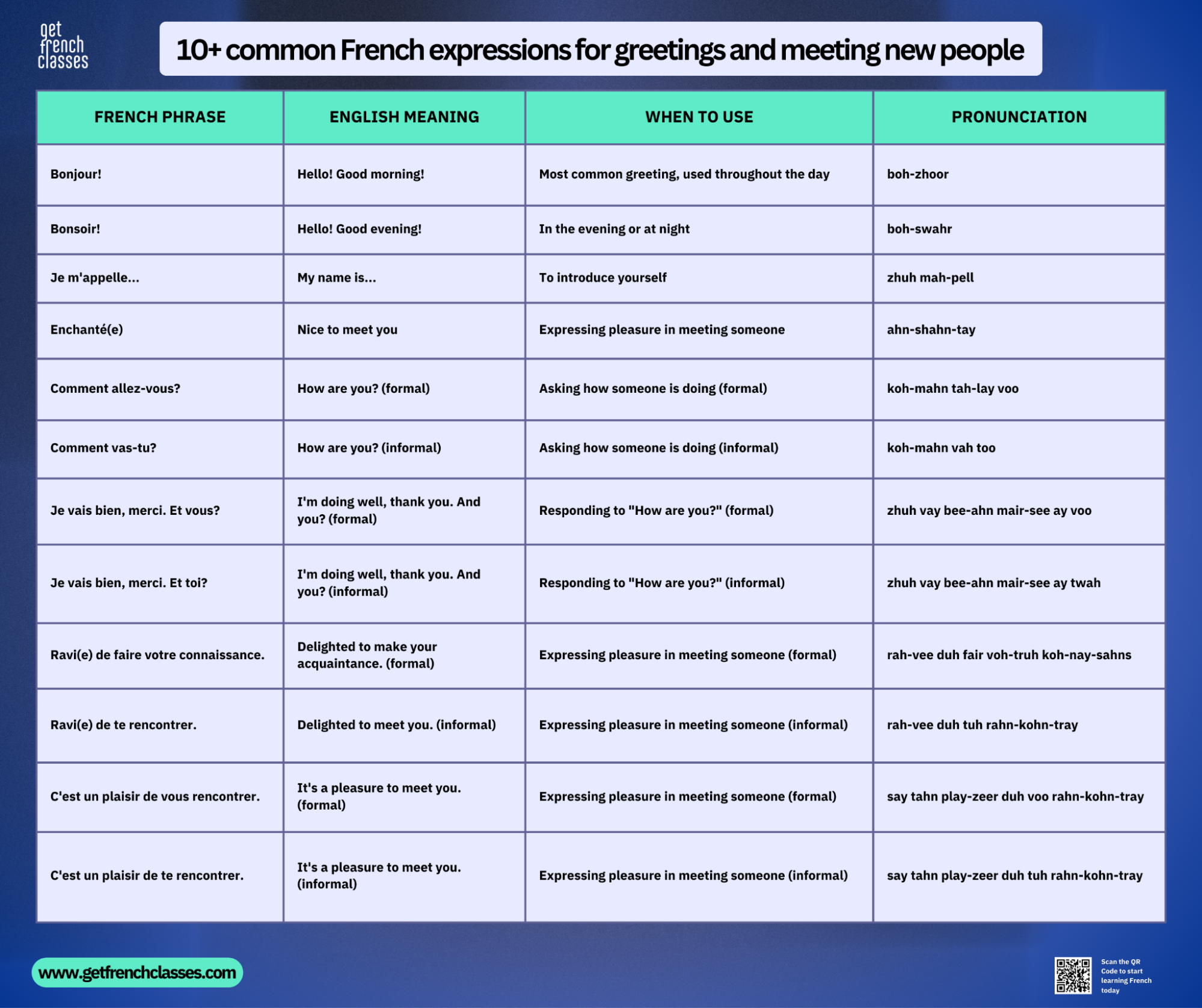
Knowing how to greet French people and introduce yourself can go a long way toward establishing a friendly rapport with the locals.
Here are some key French phrases to help you navigate social interactions:
These essential French words are crucial for travelers planning a trip to French-speaking destinations, enhancing communication and enriching the overall travel experience.
| French Phrase | English Meaning | When to Use | Pronunciation |
|---|---|---|---|
| Bonjour! | Hello! Good morning! | Most common greeting, used throughout the day | boh-zhoor |
| Bonsoir! | Hello! Good evening! | In the evening or at night | boh-swahr |
| Je m'appelle... | My name is... | To introduce yourself | zhuh mah-pell |
| Enchanté(e) | Nice to meet you | Expressing pleasure in meeting someone | ahn-shahn-tay |
| Comment allez-vous? | How are you? (formal) | Asking how someone is doing (formal) | koh-mahn tah-lay voo |
| Comment vas-tu? | How are you? (informal) | Asking how someone is doing (informal) | koh-mahn vah too |
| Je vais bien, merci. Et vous? | I'm doing well, thank you. And you? (formal) | Responding to "How are you?" (formal) | zhuh vay bee-ahn mair-see ay voo |
| Je vais bien, merci. Et toi? | I'm doing well, thank you. And you? (informal) | Responding to "How are you?" (informal) | zhuh vay bee-ahn mair-see ay twah |
| Ravi(e) de faire votre connaissance. | Delighted to make your acquaintance. (formal) | Expressing pleasure in meeting someone (formal) | rah-vee duh fair voh-truh koh-nay-sahns |
| Ravi(e) de te rencontrer. | Delighted to meet you. (informal) | Expressing pleasure in meeting someone (informal) | rah-vee duh tuh rahn-kohn-tray |
| C'est un plaisir de vous rencontrer. | It's a pleasure to meet you. (formal) | Expressing pleasure in meeting someone (formal) | say tahn play-zeer duh voo rahn-kohn-tray |
| C'est un plaisir de te rencontrer. | It's a pleasure to meet you. (informal) | Expressing pleasure in meeting someone (informal) | say tahn play-zeer duh tuh rahn-kohn-tray |
In informal settings or with people you know well, there are some nuances and variations to these greetings.
For example, instead of “ Bonjour ,” you can use “ Salut !” as a casual “Hi!”
When introducing yourself, “ Moi, c’est… “ (I’m…) is a more laid-back alternative to “ Je m’appelle. “
Among friends, “ Ça va? “ is a common way to ask “How are you?” and “ Ça va bien, et toi? “ is a relaxed response.
Lastly, “ Content(e) de te rencontrer “ (Happy to meet you) is slightly less formal than “ Ravi(e) de te rencontrer. “
Example scenarios:
-
You’re at a café in Paris and strike up a conversation with the person next to you.
-
Salut! Moi, c’est Luc. (Hi! I’m Luc.)
-
Enchantée! Je m’appelle Sophie. (Nice to meet you! My name is Sophie.)
-
-
You run into a friend on the streets of Lyon.
-
Salut, Sophie! Ça va? (Hi, Sophie! How are you?)
-
Ça va bien, et toi? (I’m doing well, and you?)
-
-
-
You’re introduced to your host family in Bordeaux.
-
Bonjour, Monsieur et Madame Dubois. Ravi de faire votre connaissance. (Hello, Mr. and Mrs. Dubois. Delighted to make your acquaintance.)
-
C’est un plaisir de te rencontrer, Sophie! (It’s a pleasure to meet you, Sophie!)
-
Remember, while it’s important to be polite, the French appreciate a friendly and sincere approach. Don’t be afraid to use informal phrases when appropriate, as it helps create a more relaxed and warm atmosphere.
11+ most commonly used French phrases to use when you’re at the restaurant
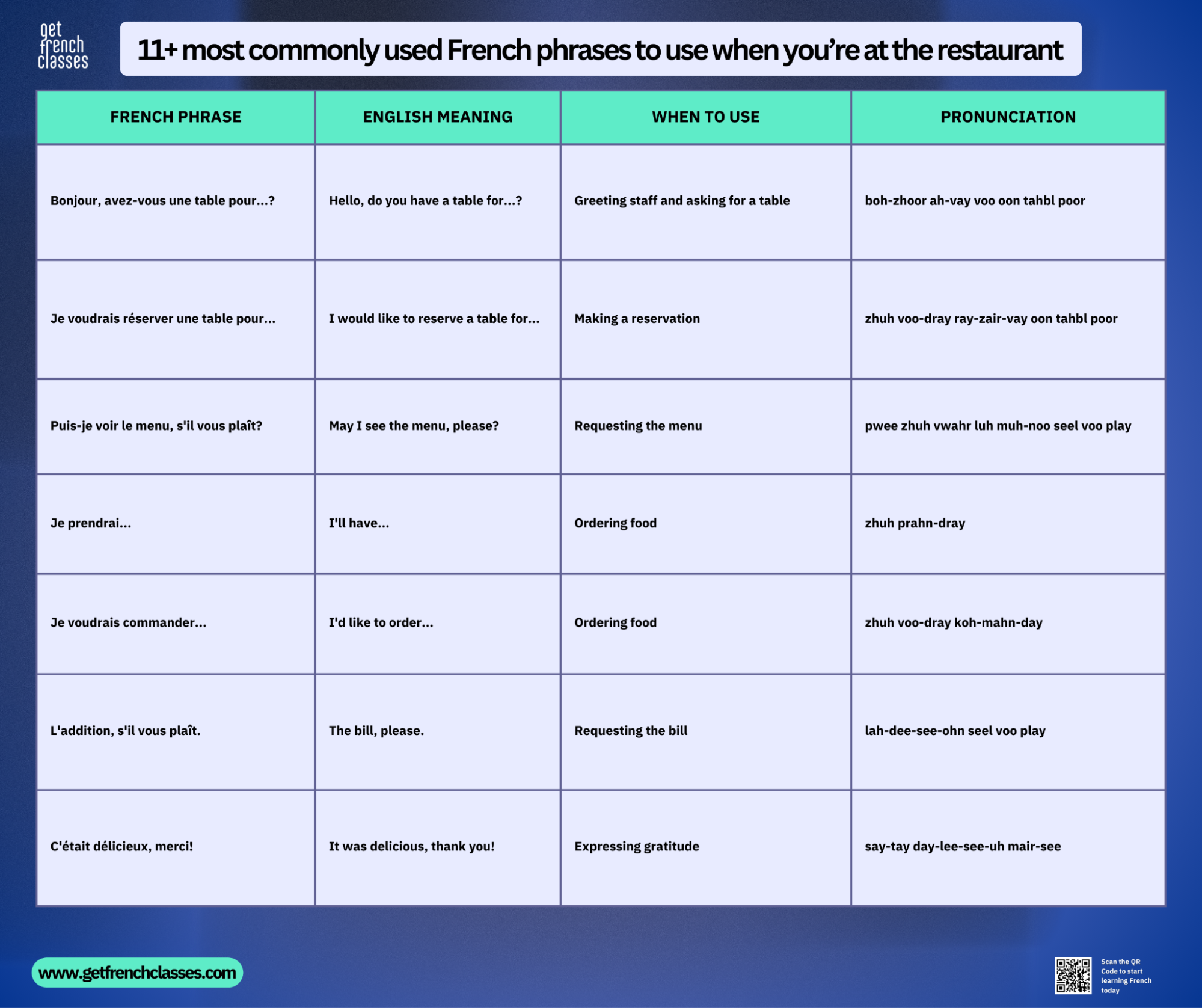
From greeting the staff to choosing the finest French cuisine from the menu to ordering your meal and requesting the bill, these expressions will ensure a smooth and enjoyable dining experience.
| French Phrase | English Meaning | When to Use | Pronunciation |
|---|---|---|---|
| Bonjour, avez-vous une table pour...? | Hello, do you have a table for...? | Greeting staff and asking for a table | boh-zhoor ah-vay voo oon tahbl poor |
| Je voudrais réserver une table pour... | I would like to reserve a table for... | Making a reservation | zhuh voo-dray ray-zair-vay oon tahbl poor |
| Puis-je voir le menu, s'il vous plaît? | May I see the menu, please? | Requesting the menu | pwee zhuh vwahr luh muh-noo seel voo play |
| Je prendrai... | I'll have... | Ordering food | zhuh prahn-dray |
| Je voudrais commander... | I'd like to order... | Ordering food | zhuh voo-dray koh-mahn-day |
| L'addition, s'il vous plaît. | The bill, please. | Requesting the bill | lah-dee-see-ohn seel voo play |
| C'était délicieux, merci! | It was delicious, thank you! | Expressing gratitude | say-tay day-lee-see-uh mair-see |
When greeting the staff and asking for a table, you can use the basic French words “ Bonjour “ or “ Salut “ and state the number of people in your party.
For example, “ Bonjour, une table pour deux, s’il vous plaît “ (Hello, a table for two, please).
If you have a reservation, you can say “ Bonjour, j’ai une réservation au nom de… “ (Hello, I have a reservation under the name…).
While ordering, you can point to the menu item and say “ Je prendrai… “ (I’ll have…) or “ Je voudrais commander… “ (I’d like to order…).
If you have any questions about the menu or need recommendations, don’t hesitate to ask the server. “ Que recommandez-vous? “ (What do you recommend?) or “ Qu’est-ce que vous me conseillez? “ (What do you suggest?) are helpful phrases.
When you’re ready for the bill, simply catch the server’s attention and say “ L’addition, s’il vous plaît “ (The bill, please). Using "s'il vous plaît" is crucial here as it shows politeness and respect, which is highly valued in French culture.
After paying, it’s polite to express your gratitude for the meal with “ C’était délicieux, merci! “ (It was delicious, thank you!).
Here’s an example scenario.
You enter a charming Parisian bistro for lunch.
-
Bonjour, une table pour deux, s’il vous plaît. (Hello, a table for two, please.)
-
Puis-je voir le menu, s’il vous plaît? (May I see the menu, please?)
-
Je prendrai le steak-frites et un verre de vin rouge. (I’ll have the steak and fries and a glass of red wine.)
-
L’addition, s’il vous plaît. (The bill, please.)
-
C’était délicieux, merci beaucoup! (It was delicious, thank you very much!)
Remember, a little politeness goes a long way in France. Always greet the staff with a friendly “Bonjour” and don’t forget to say “merci” and “s’il vous plaît.”
7+ French phrases to use when dealing with transportation (cabs and metro)
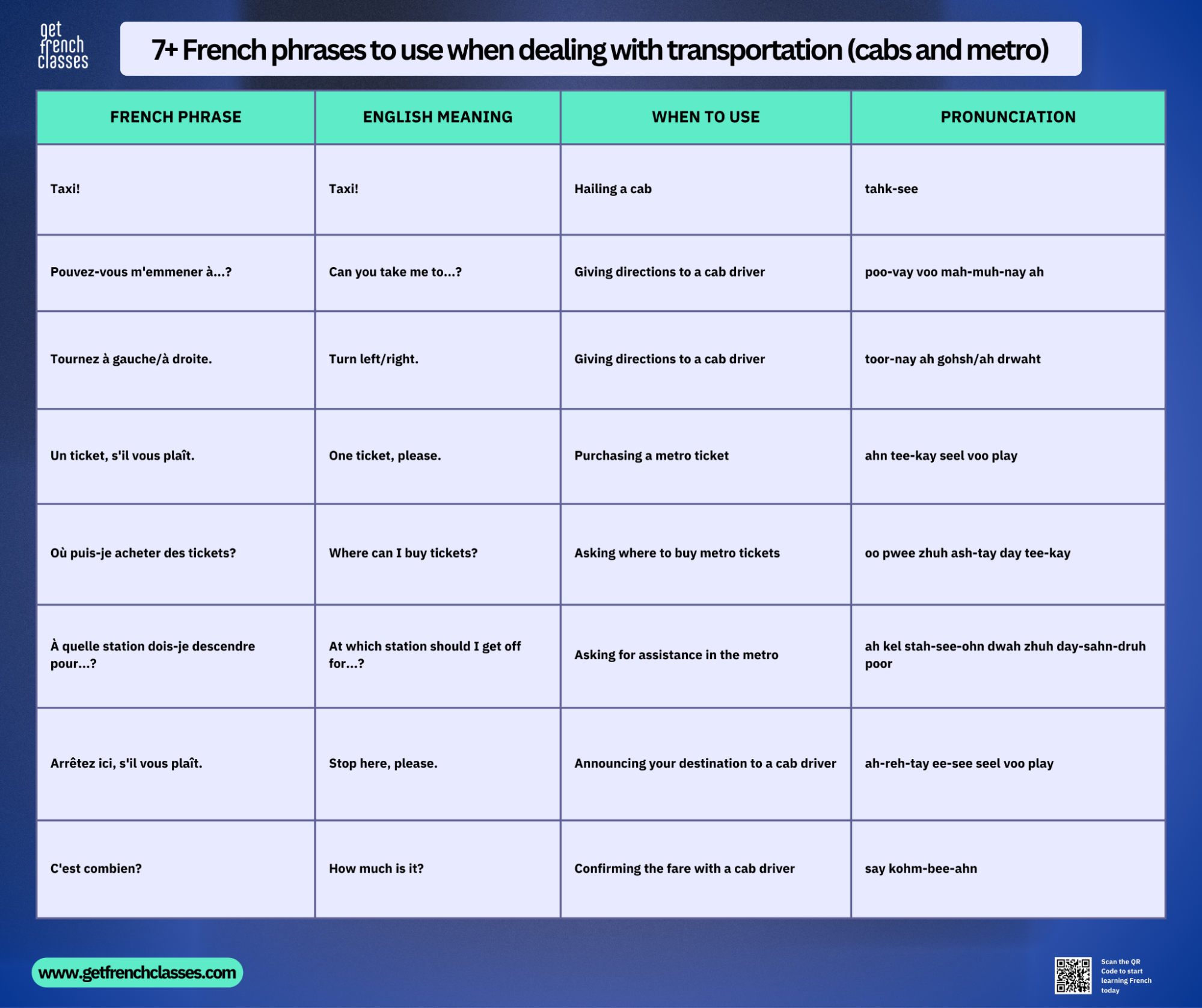
Navigating public transportation and taking cabs in France can be daunting if you’re not familiar with the French language and culture.
However, with the few common French phrases below, you’ll be able to get around with confidence.
Here are some common French phrases to help you navigate these situations: If you find yourself struggling to understand rapid French, you can always ask, "Parlez-vous anglais?" (Do you speak English?).
| French Phrase | English Meaning | When to Use | Pronunciation |
|---|---|---|---|
| Taxi! | Taxi! | Hailing a cab | tahk-see |
| Pouvez-vous m'emmener à...? | Can you take me to...? | Giving directions to a cab driver | poo-vay voo mah-muh-nay ah |
| Tournez à gauche/à droite. | Turn left/right. | Giving directions to a cab driver | toor-nay ah gohsh/ah drwaht |
| Un ticket, s'il vous plaît. | One ticket, please. | Purchasing a metro ticket | ahn tee-kay seel voo play |
| Où puis-je acheter des tickets? | Where can I buy tickets? | Asking where to buy metro tickets | oo pwee zhuh ash-tay day tee-kay |
| À quelle station dois-je descendre pour...? | At which station should I get off for...? | Asking for assistance in the metro | ah kel stah-see-ohn dwah zhuh day-sahn-druh poor |
| Arrêtez ici, s'il vous plaît. | Stop here, please. | Announcing your destination to a cab driver | ah-reh-tay ee-see seel voo play |
| C'est combien? | How much is it? | Confirming the fare with a cab driver | say kohm-bee-ahn |
When hailing a cab, simply raise your hand and say, “ Taxi! “ once the cab stops, approach the window and state your destination, “ Pouvez-vous m’emmener à … “ (Can you take me to…).
If you need to provide specific directions, use “ Tournez à gauche “ (Turn left) or “ Tournez à droite “ (Turn right).
In the metro, locate the ticket machines or booths and say, “ Un ticket, s’il vous plaît “ (One ticket, please) to purchase a ticket.
If you’re unsure where to buy tickets, ask a staff member or fellow passenger, “ Où puis-je acheter des tickets? “ (Where can I buy tickets?).
If you need help knowing where to get off, ask, “ À quelle station dois-je descendre pour…? “ (At which station should I get off for…?).
When you’re ready to exit the cab, say, “ Arrêtez ici, s’il vous plaît “ (Stop here, please). Before paying, you can confirm the fare by asking, “ C’est combien? “ (How much is it?).
Here is an example scenario.
You need to take a cab to the Louvre Museum.
-
Taxi! (Taxi!)
-
Pouvez-vous m’emmener au Musée du Louvre? (Can you take me to the Louvre Museum?)
-
Tournez à droite à la prochaine rue. (Turn right at the next street.)
-
Arrêtez ici, s’il vous plaît. (Stop here, please.)
-
C’est combien? (How much is it?)
Note that it’s always polite to greet your cab driver or metro staff with a “Bonjour” and thank them with a “Merci” when exiting.
8 French expressions to ask for directions, including 'où sont les toilettes', and famous landmarks
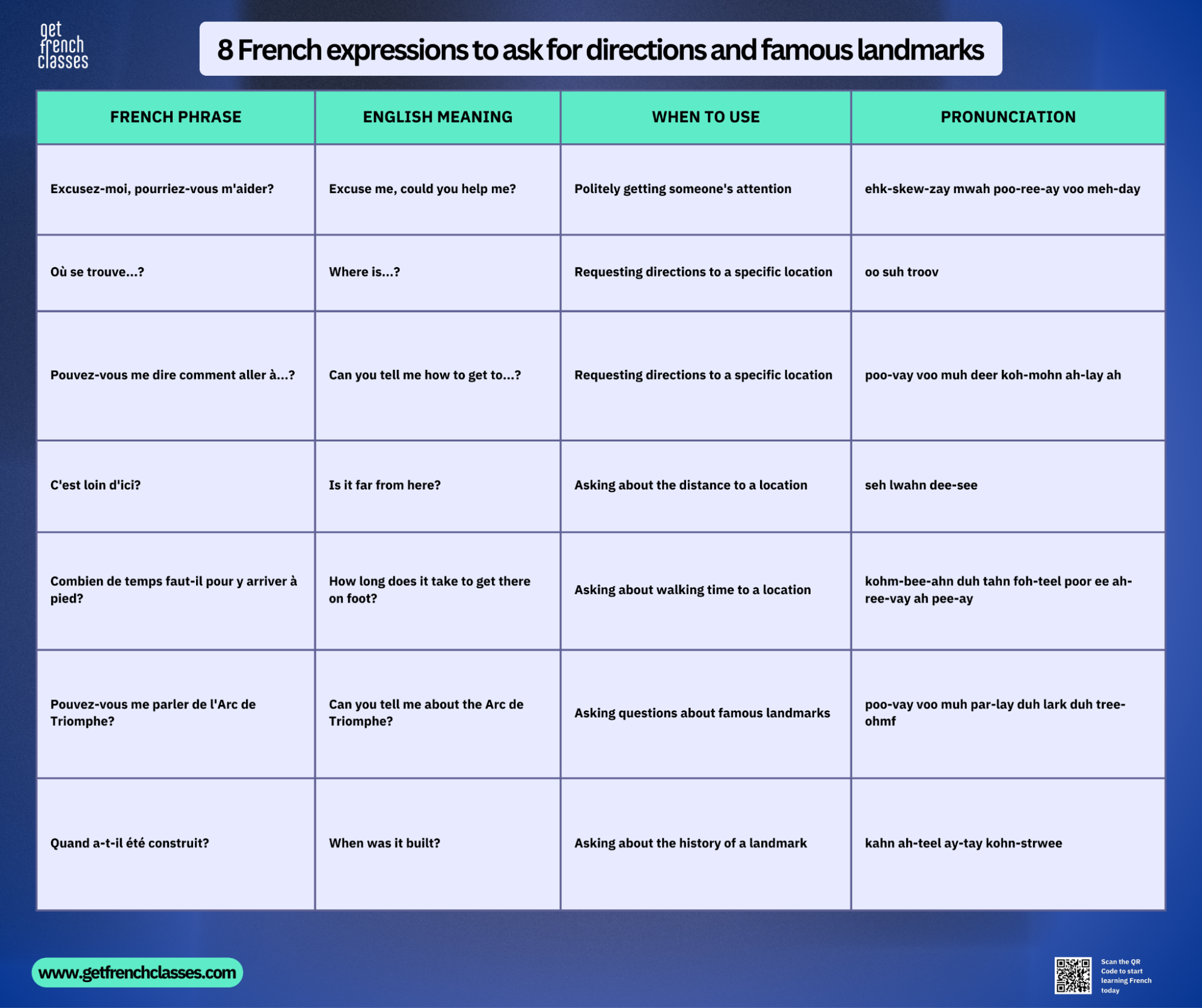
Here’s how to politely approach someone and ask for assistance, direction, and location. If you need to communicate in English, you can ask, "Parlez-vous anglais?" (Do you speak English?).
| French Phrase | English Meaning | When to Use | Pronunciation |
|---|---|---|---|
| Excusez-moi, pourriez-vous m'aider? | Excuse me, could you help me? | Politely getting someone's attention | ehk-skew-zay mwah poo-ree-ay voo meh-day |
| Où se trouve...? | Where is...? | Requesting directions to a specific location | oo suh troov |
| Pouvez-vous me dire comment aller à...? | Can you tell me how to get to...? | Requesting directions to a specific location | poo-vay voo muh deer koh-mohn ah-lay ah |
| C'est loin d'ici? | Is it far from here? | Asking about the distance to a location | seh lwahn dee-see |
| Combien de temps faut-il pour y arriver à pied? | How long does it take to get there on foot? | Asking about walking time to a location | kohm-bee-ahn duh tahn foh-teel poor ee ah-ree-vay ah pee-ay |
| Pouvez-vous me parler de l'Arc de Triomphe? | Can you tell me about the Arc de Triomphe? | Asking questions about famous landmarks | poo-vay voo muh par-lay duh lark duh tree-ohmf |
| Quand a-t-il été construit? | When was it built? | Asking about the history of a landmark | kahn ah-teel ay-tay kohn-strwee |
When approaching someone for directions, start with “ Excusez-moi “ (Excuse me) to politely get their attention.
Then, you can ask, “ Où se trouve…? “ (Where is…?) or “ Pouvez-vous me dire comment aller à…? “ (Can you tell me how to get to…?) followed by your desired destination.
If you want to know the distance or walking time to a location, ask, “ C’est loin d’ici? “ (Is it far from here?) or “ Combien de temps faut-il pour y arriver à pied? “ (How long does it take to get there on foot?).
When inquiring about famous landmarks, such as the Arc de Triomphe or the Champs-Élysées, you can say, “ Pouvez-vous me parler de…? “ (Can you tell me about…?) followed by the landmark’s name.
You can also ask specific questions like, “ Quand a-t-il été construit? “ (When was it built?).
Here is an example scenario.
You’re trying to find your way to the Arc de Triomphe.
-
Excusez-moi, pourriez-vous m’aider? (Excuse me, could you help me?)
-
Où se trouve l’Arc de Triomphe? (Where is the Arc de Triomphe?)
-
C’est loin d’ici? (Is it far from here?)
-
Combien de temps faut-il pour y arriver à pied? (How long does it take to get there on foot?)
-
Pouvez-vous me parler de l’Arc de Triomphe? (Can you tell me about the Arc de Triomphe?)
When receiving directions, pay attention to key phrases like “ tournez à gauche “ (turn left), “ tournez à droite “ (turn right), “ continuez tout droit “ (continue straight ahead), and “ traversez la rue “ (cross the street).
Remember, the French appreciate politeness, so always start with “ Excusez-moi “ and end with “ Merci beaucoup “ (Thank you very much) when receiving assistance.
5+ French words and phrases to use when indicating your location
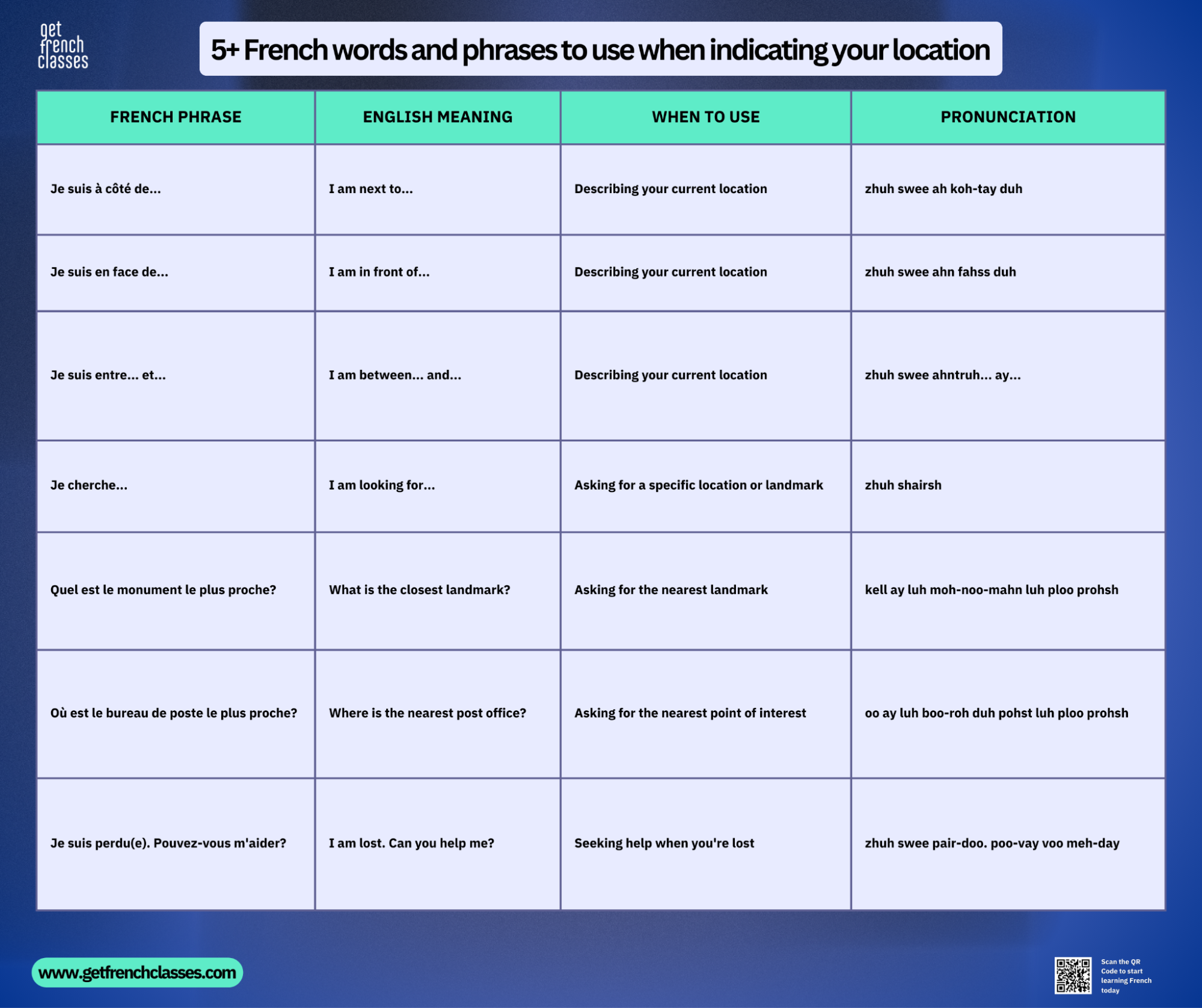
When exploring France, you may find yourself needing to describe your location, ask for nearby landmarks, or seek help if you're lost.
Being able to communicate your location clearly can make all the difference in getting the assistance you need. And here are some French phrases you can use in that scenario.
| French Phrase | English Meaning | When to Use | Pronunciation |
|---|---|---|---|
| Je suis à côté de... | I am next to... | Describing your current location | zhuh swee ah koh-tay duh |
| Je suis en face de... | I am in front of... | Describing your current location | zhuh swee ahn fahss duh |
| Je suis entre... et... | I am between... and... | Describing your current location | zhuh swee ahntruh... ay... |
| Je cherche... | I am looking for... | Asking for a specific location or landmark | zhuh shairsh |
| Quel est le monument le plus proche? | What is the closest landmark? | Asking for the nearest landmark | kell ay luh moh-noo-mahn luh ploo prohsh |
| Où est le bureau de poste le plus proche? | Where is the nearest post office? | Asking for the nearest point of interest | oo ay luh boo-roh duh pohst luh ploo prohsh |
| Je suis perdu(e). Pouvez-vous m'aider? | I am lost. Can you help me? | Seeking help when you're lost | zhuh swee pair-doo. poo-vay voo meh-day |
To describe your current location, use phrases like " Je suis à côté de... " (I am next to...), " Je suis en face de... " (I am in front of...), or " Je suis entre... et... " (I am between... and...), followed by the relevant landmarks or street names.
If you're looking for a specific location or landmark, you can say " Je cherche... " (I am looking for...) followed by the name of the place you're trying to find.
To ask for the nearest landmark or point of interest, use the phrase " Quel est le... le plus proche? " (What is the closest...?) or " Où est le... le plus proche? " (Where is the nearest...?) followed by the type of landmark or point of interest you're looking for, such as " monument " (landmark) or " bureau de poste " (post office).
If you find yourself lost, don't hesitate to ask for help by saying, " Je suis perdu(e). Pouvez-vous m'aider? " (I am lost. Can you help me?). Most French people will be happy to assist you.
Here's an example scenario.
You're lost and trying to find your way back to your hotel.
-
Excusez-moi, je suis perdu(e). Pouvez-vous m'aider? (Excuse me, I am lost. Can you help me?)
-
Je cherche l'Hôtel du Parc. (I am looking for the Hotel du Parc.)
-
Je suis à côté de la boulangerie. (I am next to the bakery.)
-
Quel est le monument le plus proche? (What is the closest landmark?)
Remember, when asking for help or directions, always start with a polite " Excusez-moi " and end with a sincere " Merci beaucoup " to show your appreciation for the assistance provided.
5+ common French expressions to use when shopping and bargaining
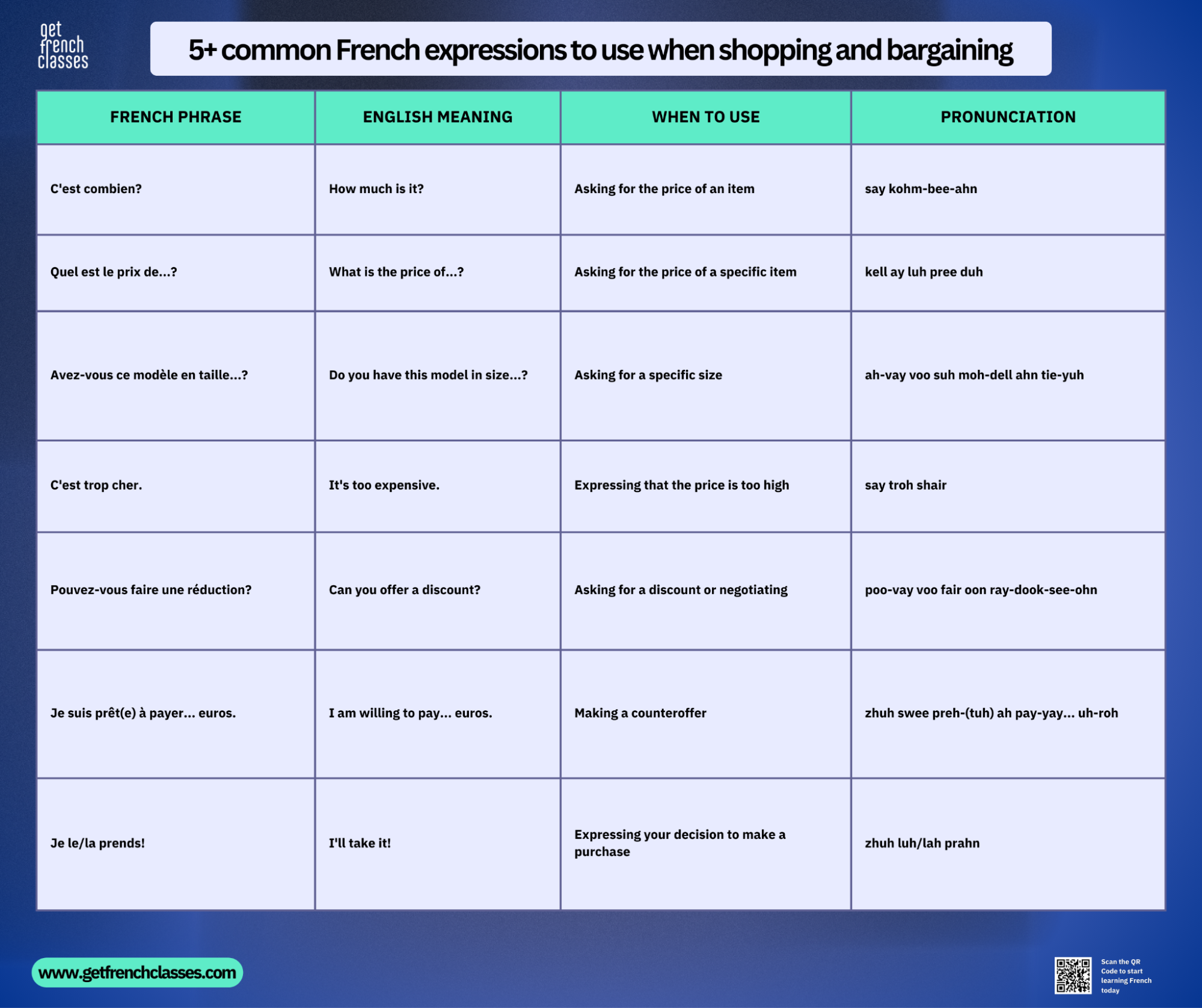
| French Phrase | English Meaning | When to Use | Pronunciation |
|---|---|---|---|
| C'est combien? | How much is it? | Asking for the price of an item | say kohm-bee-ahn |
| Quel est le prix de...? | What is the price of...? | Asking for the price of a specific item | kell ay luh pree duh |
| Avez-vous ce modèle en taille...? | Do you have this model in size...? | Asking for a specific size | ah-vay voo suh moh-dell ahn tie-yuh |
| C'est trop cher. | It's too expensive. | Expressing that the price is too high | say troh shair |
| Pouvez-vous faire une réduction? | Can you offer a discount? | Asking for a discount or negotiating | poo-vay voo fair oon ray-dook-see-ohn |
| Je suis prêt(e) à payer... euros. | I am willing to pay... euros. | Making a counteroffer | zhuh swee preh-(tuh) ah pay-yay... uh-roh |
| Je le/la prends! | I'll take it! | Expressing your decision to make a purchase | zhuh luh/lah prahn |
When you find an item you like, you can ask for the price by simply saying, " C'est combien? " (How much is it?) or " Quel est le prix de...? " (What is the price of...?) followed by the item's name.
If you're looking for a specific size, ask, " Avez-vous ce modèle en taille...? " (Do you have this model in size...?) followed by the size you need.
If you find the price to be too high, you can express this by saying " C'est trop cher " (It's too expensive).
To negotiate a better deal, ask, " Pouvez-vous faire une réduction? " (Can you offer a discount?). You can also make a counteroffer by stating, " Je suis prêt(e) à payer... euros " (I am willing to pay... euros).
Once you've decided to make a purchase, simply say, " Je le/la prends! " (I'll take it!). Use " le " for masculine nouns and " la " for feminine nouns.
Here’s an example scenario.
You're at a market and want to buy a scarf.
-
C'est combien pour cette écharpe? (How much is this scarf?)
-
C'est trop cher. Pouvez-vous faire une réduction? (It's too expensive. Can you offer a discount?)
-
Je suis prêt(e) à payer 15 euros. (I am willing to pay 15 euros.)
-
Je la prends! (I'll take it!)
Remember to always be polite when negotiating and to start and end your interactions with " Bonjour " and " Merci ."
8+ common French expressions and French words to use in emergency situations
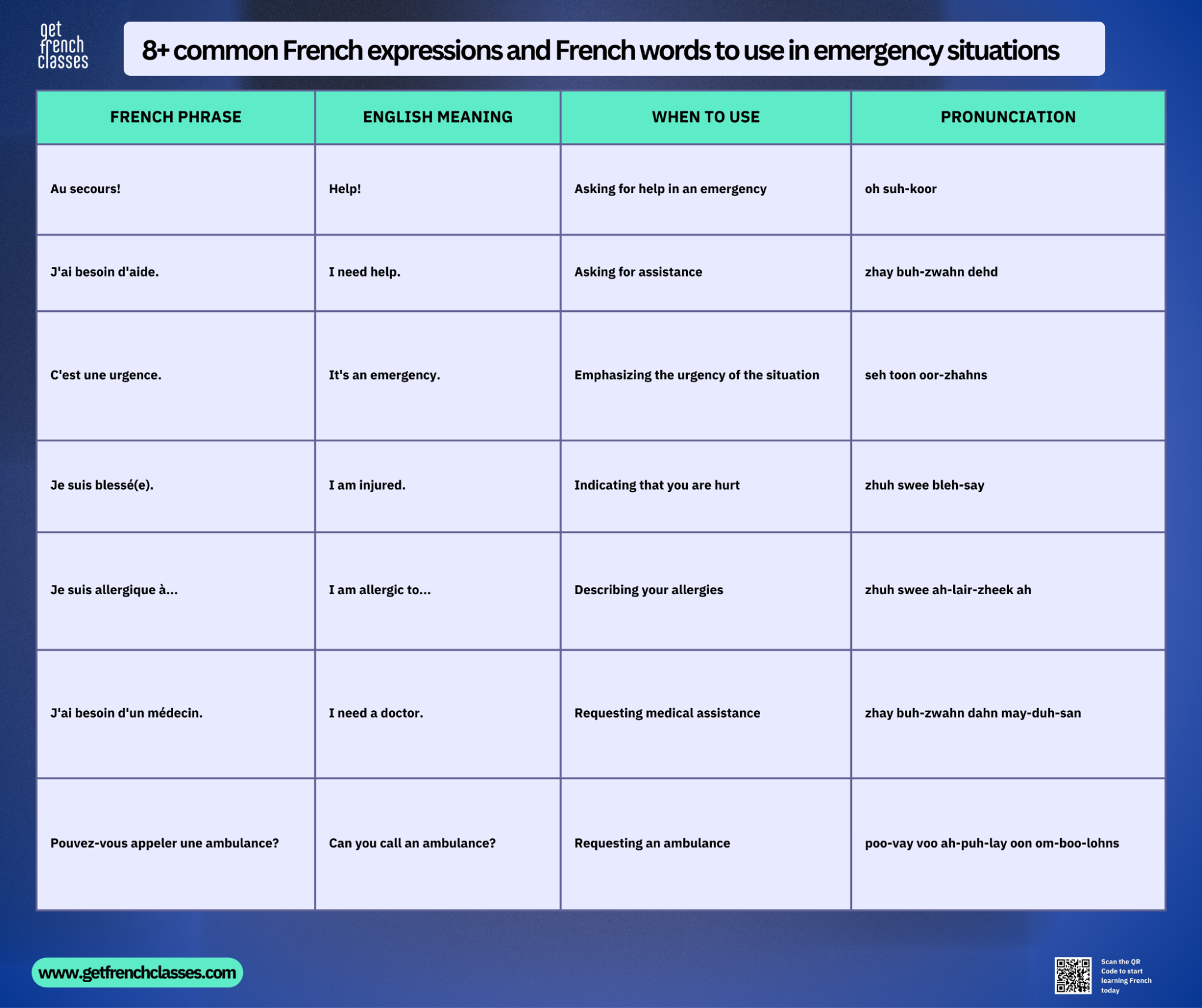
Being able to ask for help, describe medical issues, and contact the appropriate authorities can make a significant difference in ensuring your safety and well-being.
| French Phrase | English Meaning | When to Use | Pronunciation |
|---|---|---|---|
| Au secours! | Help! | Asking for help in an emergency | oh suh-koor |
| J'ai besoin d'aide. | I need help. | Asking for assistance | zhay buh-zwahn dehd |
| C'est une urgence. | It's an emergency. | Emphasizing the urgency of the situation | seh toon oor-zhahns |
| Je suis blessé(e). | I am injured. | Indicating that you are hurt | zhuh swee bleh-say |
| Je suis allergique à... | I am allergic to... | Describing your allergies | zhuh swee ah-lair-zheek ah |
| J'ai besoin d'un médecin. | I need a doctor. | Requesting medical assistance | zhay buh-zwahn dahn may-duh-san |
| Pouvez-vous appeler une ambulance? | Can you call an ambulance? | Requesting an ambulance | poo-vay voo ah-puh-lay oon om-boo-lohns |
| Où est le commissariat de police le plus proche? | Where is the nearest police station? | Asking for the location of the police station | oo ay luh koh-mee-sah-ree-ah duh poh-lees luh ploo prohsh |
In case of an emergency, you can shout " Au secours! " (Help!) to draw attention and ask for assistance.
You can also say " J'ai besoin d'aide " (I need help) or " C'est une urgence " (It's an emergency) to convey the urgency of the situation.
If you are injured, say " Je suis blessé(e) " (I am injured).
If you have any allergies, you can let medical professionals know by stating " Je suis allergique à... " (I am allergic to...) followed by the specific allergen.
When you need medical assistance, say, " J'ai besoin d'un médecin " (I need a doctor).
If the situation is critical, ask someone to call an ambulance by saying, " Pouvez-vous appeler une ambulance? " (Can you call an ambulance?).
If you need to report a crime or an incident to the police, ask for the nearest police station by saying, " Où est le commissariat de police le plus proche? " (Where is the nearest police station?).
Here's an example scenario.
You witnessed an accident and need to call for help.
-
Au secours! Il y a eu un accident. (Help! There's been an accident.)
-
C'est une urgence. Pouvez-vous appeler une ambulance? (It's an emergency. Can you call an ambulance?)
-
Je suis allergique aux arachides. (I am allergic to peanuts.)
-
Où est le commissariat de police le plus proche? (Where is the nearest police station?)
Remember to stay calm, speak clearly, and provide as much information as possible when communicating in an emergency situation.
6+ mostly used French expressions to make reservations and bookings
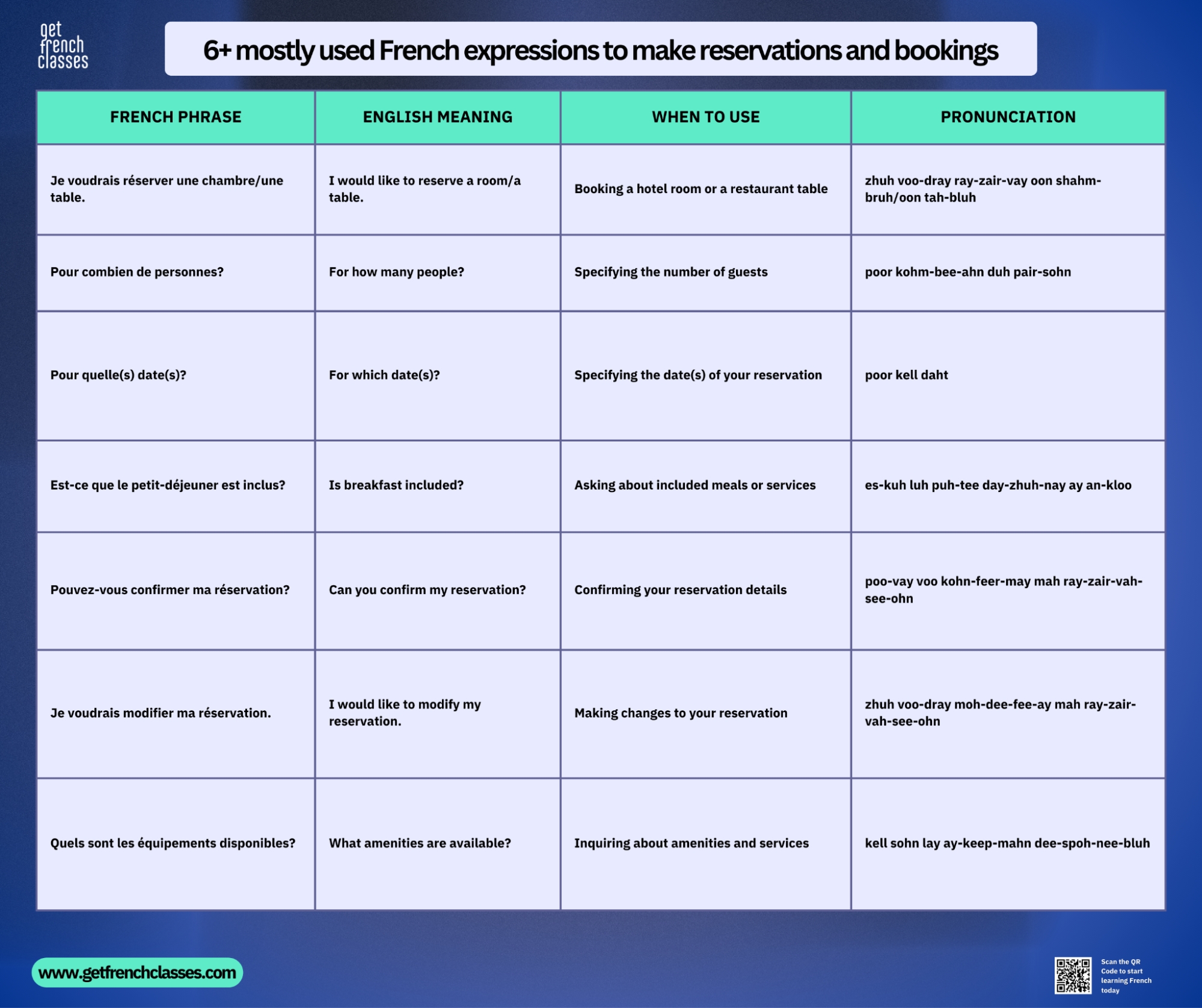
Being able to communicate your needs and preferences effectively can help you secure the perfect room or table and make any necessary changes.
Here are common French expressions that'll help in that situation.
| French Phrase | English Meaning | When to Use | Pronunciation |
|---|---|---|---|
| Je voudrais réserver une chambre/une table. | I would like to reserve a room/a table. | Booking a hotel room or a restaurant table | zhuh voo-dray ray-zair-vay oon shahm-bruh/oon tah-bluh |
| Pour combien de personnes? | For how many people? | Specifying the number of guests | poor kohm-bee-ahn duh pair-sohn |
| Pour quelle(s) date(s)? | For which date(s)? | Specifying the date(s) of your reservation | poor kell daht |
| Est-ce que le petit-déjeuner est inclus? | Is breakfast included? | Asking about included meals or services | es-kuh luh puh-tee day-zhuh-nay ay an-kloo |
| Pouvez-vous confirmer ma réservation? | Can you confirm my reservation? | Confirming your reservation details | poo-vay voo kohn-feer-may mah ray-zair-vah-see-ohn |
| Je voudrais modifier ma réservation. | I would like to modify my reservation. | Making changes to your reservation | zhuh voo-dray moh-dee-fee-ay mah ray-zair-vah-see-ohn |
| Quels sont les équipements disponibles? | What amenities are available? | Inquiring about amenities and services | kell sohn lay ay-keep-mahn dee-spoh-nee-bluh |
To book a hotel room or a table at a restaurant, start by saying, " Je voudrais réserver une chambre/une table " (I would like to reserve a room/a table).
Specify the number of people with " Pour combien de personnes? " (For how many people?) and the dates with " Pour quelle(s) date(s)? " (For which date(s)?).
When booking a hotel room, you may want to ask about included meals or services, such as " Est-ce que le petit-déjeuner est inclus? " (Is breakfast included?).
After making your reservation, it's a good idea to confirm the details by asking, " Pouvez-vous confirmer ma réservation? " (Can you confirm my reservation?).
If you need to make changes, say, " Je voudrais modifier ma réservation " (I would like to modify my reservation).
To inquire about available amenities or services, ask, " Quels sont les équipements disponibles? " (What amenities are available?).
Here is an example scenario.
You're booking a hotel room for your upcoming trip to Paris.
-
Je voudrais réserver une chambre pour deux personnes. (I would like to reserve a room for two people.)
-
Pour quelles dates? Du 15 au 20 juin. (For which dates? From June 15th to 20th.)
-
Est-ce que le petit-déjeuner est inclus? (Is breakfast included?)
-
Pouvez-vous confirmer ma réservation? (Can you confirm my reservation?)
Remember to be polite and clear when making reservations or booking tables. Don't hesitate to ask questions about the available options, services, or any specific requirements you may have.
Read more :
"I can understand French but can't speak it" Do This to Fix It
How Long Does It Take to Learn French?
Why We Set Out to Create the Best Online French Course
7+ expressions to show gratitude and say goodbye in French
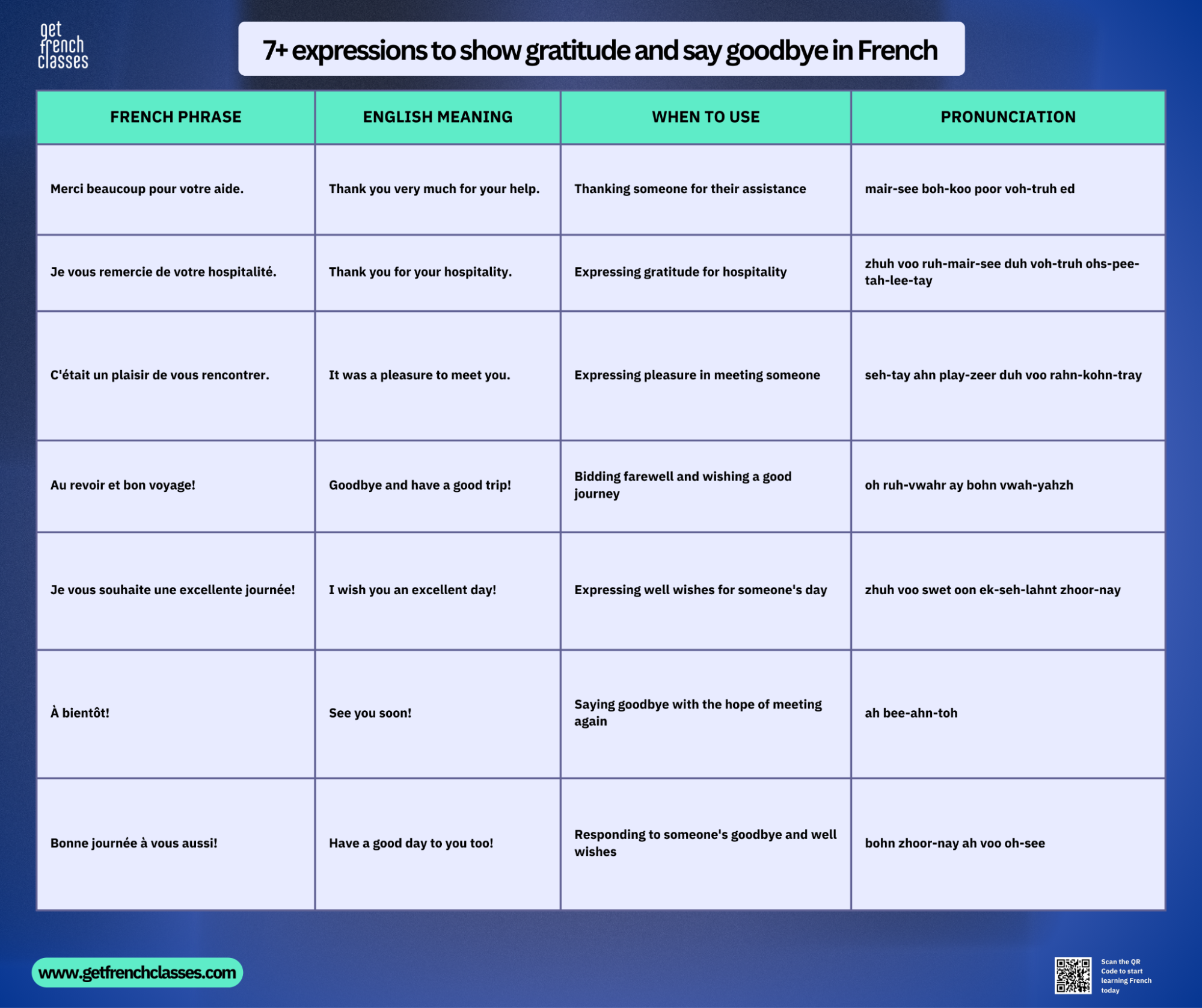
Knowing how to thank people for their help or hospitality and how to say goodbye properly will leave a positive and lasting impression and show your appreciation for the kindness you've received during your stay in France.
| French Phrase | English Meaning | When to Use | Pronunciation |
|---|---|---|---|
| Merci beaucoup pour votre aide. | Thank you very much for your help. | Thanking someone for their assistance | mair-see boh-koo poor voh-truh ed |
| Je vous remercie de votre hospitalité. | Thank you for your hospitality. | Expressing gratitude for hospitality | zhuh voo ruh-mair-see duh voh-truh ohs-pee-tah-lee-tay |
| C'était un plaisir de vous rencontrer. | It was a pleasure to meet you. | Expressing pleasure in meeting someone | seh-tay ahn play-zeer duh voo rahn-kohn-tray |
| Au revoir et bon voyage! | Goodbye and have a good trip! | Bidding farewell and wishing a good journey | oh ruh-vwahr ay bohn vwah-yahzh |
| Je vous souhaite une excellente journée! | I wish you an excellent day! | Expressing well wishes for someone's day | zhuh voo swet oon ek-seh-lahnt zhoor-nay |
| À bientôt! | See you soon! | Saying goodbye with the hope of meeting again | ah bee-ahn-toh |
| Bonne journée à vous aussi! | Have a good day to you too! | Responding to someone's goodbye and well wishes | bohn zhoor-nay ah voo oh-see |
When thanking someone for their help, you can say, " Merci beaucoup pour votre aide " (Thank you very much for your help).
If you've been a guest at someone's home or have experienced exceptional hospitality, express your gratitude by saying, " Je vous remercie de votre hospitalité " (Thank you for your hospitality).
As you say goodbye to someone you've enjoyed meeting, you can say, " C'était un plaisir de vous rencontrer " (It was a pleasure meeting you).
When bidding farewell, you can use " Au revoir " (Goodbye) followed by well wishes such as " bon voyage! " (have a good trip!) or " Je vous souhaite une excellente journée! " (I wish you an excellent day!).
If you hope to see the person again soon, you can say, " À bientôt! " (See you soon!).
If someone wishes you a good day as they say goodbye, you can respond with " Bonne journée à vous aussi! " (Have a good day to you too!).
Here's an example scenario.
You're leaving your hotel and saying goodbye to the friendly staff.
-
Merci beaucoup pour votre aide pendant mon séjour. (Thank you very much for your help during my stay.)
-
C'était un plaisir de vous rencontrer. Au revoir et bon voyage! (It was a pleasure to meet you. Goodbye and have a good trip!)
-
Bonne journée à vous aussi! (Have a good day to you too!)
Remember, a sincere " merci " and a warm goodbye leave a positive impression and foster good relationships with the people you meet during your time in France.
9+ French filler words and exclamations to sound like a native French speaker
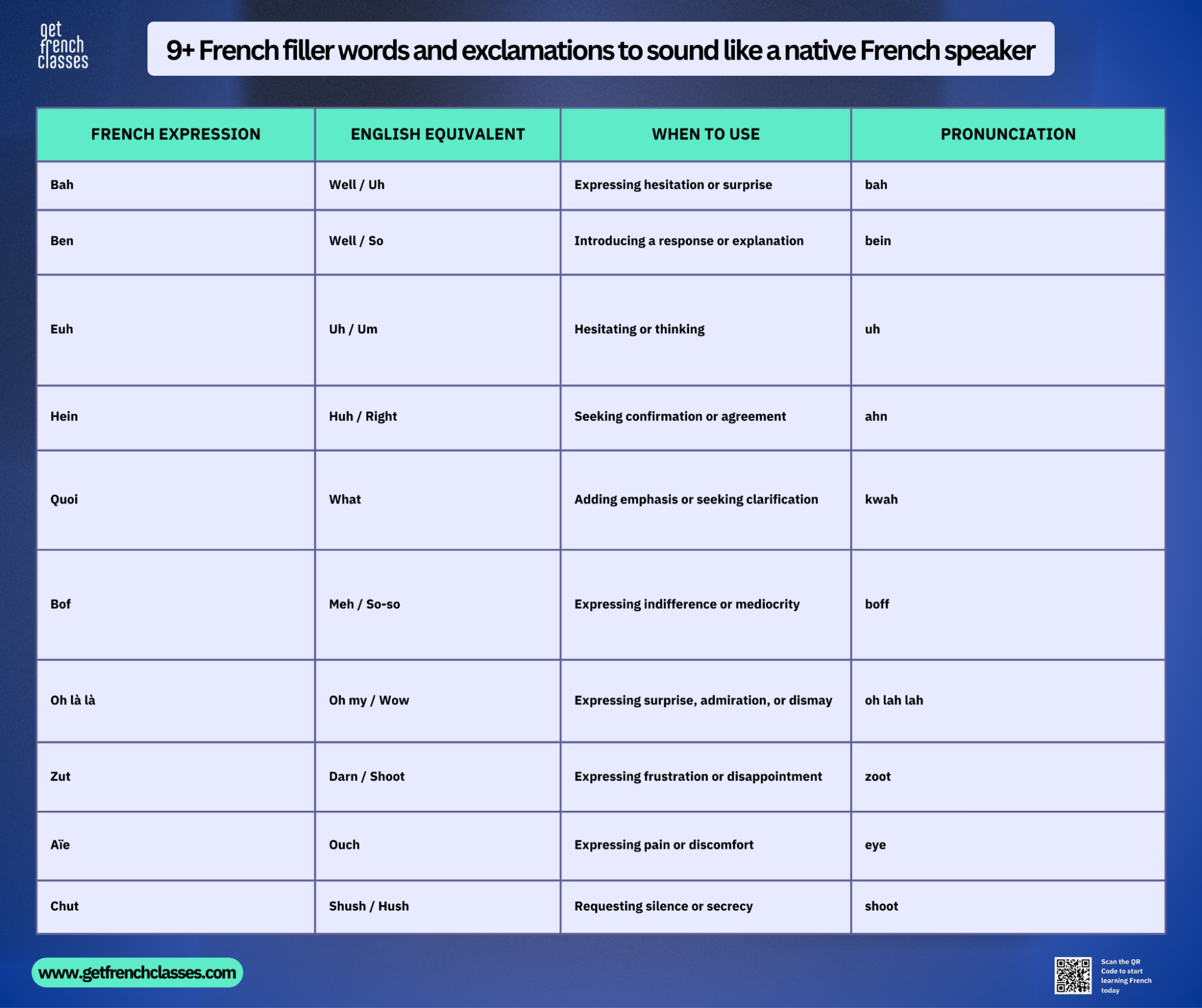
Filler words and exclamations are an essential part of any language, and French is no exception.
These French words and phrases help to keep the conversation flowing, express emotions, and add emphasis to what you're saying.
Here are some common French filler words and exclamations to include in your vocabulary:
| French Expression | English Equivalent | When to Use | Pronunciation |
|---|---|---|---|
| Bah | Well / Uh | Expressing hesitation or surprise | bah |
| Ben | Well / So | Introducing a response or explanation | bein |
| Euh | Uh / Um | Hesitating or thinking | uh |
| Hein | Huh / Right | Seeking confirmation or agreement | ahn |
| Quoi | What | Adding emphasis or seeking clarification | kwah |
| Bof | Meh / So-so | Expressing indifference or mediocrity | boff |
| Oh là là | Oh my / Wow | Expressing surprise, admiration, or dismay | oh lah lah |
| Zut | Darn / Shoot | Expressing frustration or disappointment | zoot |
| Aïe | Ouch | Expressing pain or discomfort | eye |
| Chut | Shush / Hush | Requesting silence or secrecy | shoot |
These filler words and exclamations are commonly used in informal conversations and can help you sound more natural when speaking French. They express various emotions and reactions, so they can make your speech more authentic and engaging.
Filler words like " Euh... " and " Bah... " are commonly used when hesitating or thinking about what to say next. They can help you buy time while formulating your thoughts or searching for the right words.
" Quoi " is often used at the end of a sentence to add emphasis or seek confirmation from the listener. It's similar to the English filler word "right?" or "you know?"
" Bof " is a useful exclamation to express indifference or a lack of enthusiasm. It's the equivalent of saying "meh" or "whatever" in English.
Exclamations like " Aïe ! " and " Oh là là ! " are used to express various emotions. "Aïe !" is used when experiencing pain or discomfort, similar to saying "Ouch!" in English.
" Oh là là ! " is a versatile exclamation that can convey surprise, admiration, or dismay, depending on the context and tone.
" Zut ! " is a mild exclamation used to express frustration or disappointment, much like saying "Darn it!" or "Shoot!" in English.
Here's an example scenario:
You're telling a story and trying to remember a specific detail.
-
Euh... je ne me souviens plus exactement... (Uh... I don't remember exactly...)
-
Bah... c'était il y a longtemps, quoi. (Well... it was a long time ago, you know?)
Here's another example scenario.
You're discussing a movie with a friend.
-
J'ai trouvé le film plutôt moyen. (I found the movie rather mediocre.)
-
Bof, je ne sais pas. Je l'ai bien aimé, moi. (Meh, I don't know. I liked it.)
And here's another example scenario.
You accidentally stub your toe on a chair.
-
Aïe ! Ça fait mal ! (Ouch! That hurts!)
-
Oh là là, tu t'es fait mal ? Ça va ? (Oh my, did you hurt yourself? Are you okay?)
And here's some more example scenarios.
When you're not sure how to respond to a question:
-
Bah, je ne sais pas trop. (Well, I don't really know.)
When you're giving an explanation:
-
Ben, c'est comme ça que ça s'est passé. (So, that's how it happened.)
When you're thinking about what to say next:
-
Euh, laisse-moi réfléchir. (Um, let me think.)
When you want to make sure you understood correctly:
-
Tu viens demain, hein ? (You're coming tomorrow, right?)
When you want to emphasize something:
-
C'est incroyable, quoi ! (It's incredible, you know!)
When you're not particularly impressed:
-
Le film était bof. (The movie was meh.)
When you're surprised or impressed:
-
Oh là là, c'est magnifique ! (Wow, it's magnificent!)
When something doesn't go as planned:
-
Zut, j'ai oublié mes clés. (Darn, I forgot my keys.)
When you hurt yourself:
-
Aïe, je me suis cogné le pied. (Ouch, I stubbed my toe.)
When you want someone to be quiet:
-
Chut, ne fais pas de bruit. (Hush, don't make noise.)
10+ French phrases commonly used to express opinions, agreements, or disagreements
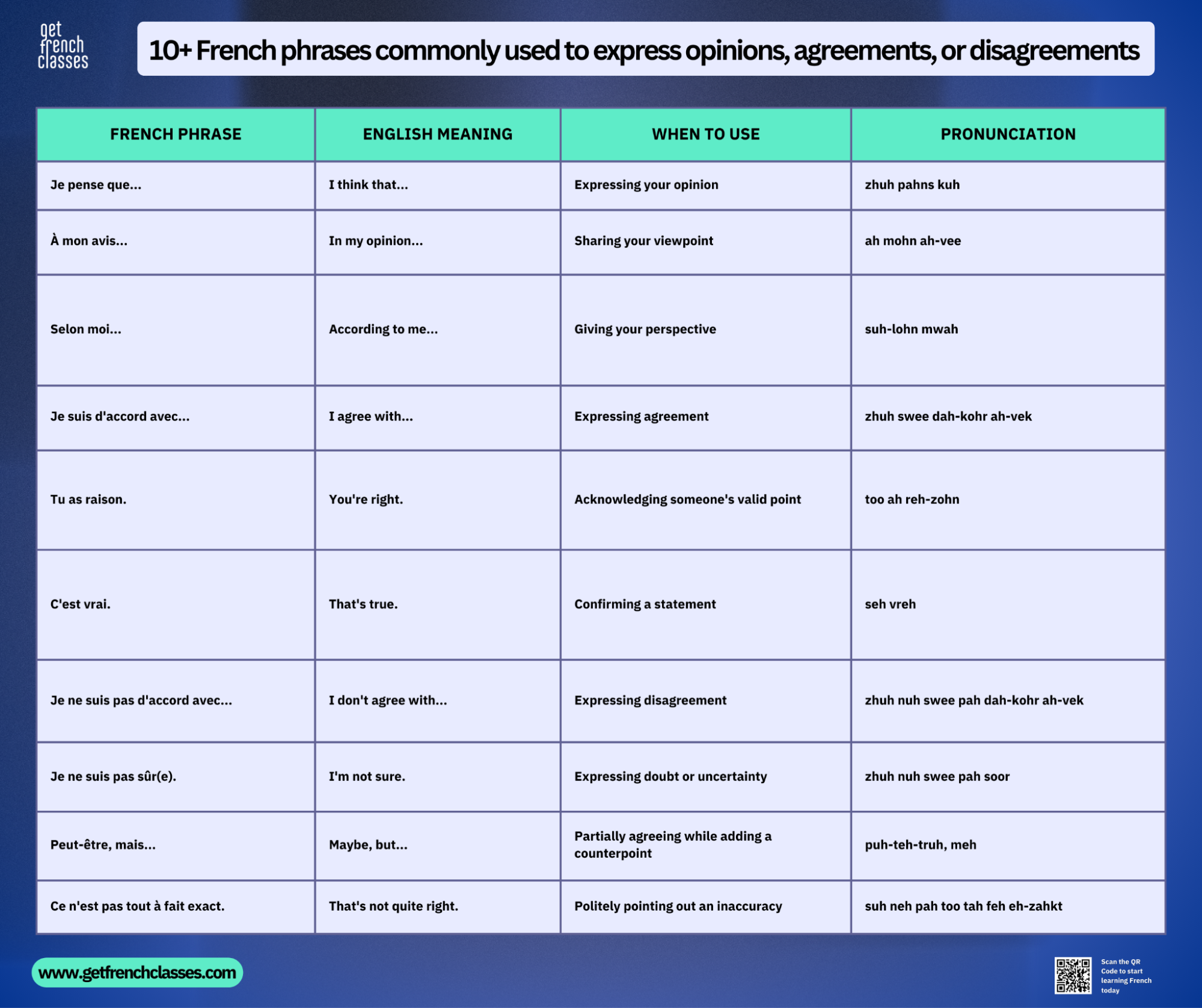
When having conversations in French, you need to know how to express your opinions and respond to others' viewpoints politely.
Here are some useful phrases for expressing personal opinions and agreeing or disagreeing with others:
| French Phrase | English Meaning | When to Use | Pronunciation |
|---|---|---|---|
| Je pense que... | I think that... | Expressing your opinion | zhuh pahns kuh |
| À mon avis... | In my opinion... | Sharing your viewpoint | ah mohn ah-vee |
| Selon moi... | According to me... | Giving your perspective | suh-lohn mwah |
| Je suis d'accord avec... | I agree with... | Expressing agreement | zhuh swee dah-kohr ah-vek |
| Tu as raison. | You're right. | Acknowledging someone's valid point | too ah reh-zohn |
| C'est vrai. | That's true. | Confirming a statement | seh vreh |
| Je ne suis pas d'accord avec... | I don't agree with... | Expressing disagreement | zhuh nuh swee pah dah-kohr ah-vek |
| Je ne suis pas sûr(e). | I'm not sure. | Expressing doubt or uncertainty | zhuh nuh swee pah soor |
| Peut-être, mais... | Maybe, but... | Partially agreeing while adding a counterpoint | puh-teh-truh, meh |
| Ce n'est pas tout à fait exact. | That's not quite right. | Politely pointing out an inaccuracy | suh neh pah too tah feh eh-zahkt |
When expressing your opinion, start with phrases like " Je pense que... " (I think that...), " À mon avis... " (In my opinion...), or " Selon moi... " (According to me...). These introductory phrases soften your statement and make it clear that you're sharing a personal viewpoint.
To express agreement, use phrases such as " Je suis d'accord avec... " (I agree with...), " Tu as raison. " (You're right.), or simply " C'est vrai. " (That's true.). These phrases show that you acknowledge and support the other person's perspective.
When disagreeing, it's important to do so politely. Use phrases like " Je ne suis pas d'accord avec... " (I don't agree with...) or " Je ne suis pas sûr(e). " (I'm not sure.) to express your differing opinion. If you partially agree but want to add a counterpoint, start with " Peut-être, mais... " (Maybe, but...).
If you need to point out an inaccuracy or mistake, do so gently with a phrase like " Ce n'est pas tout à fait exact. " (That's not quite right.). This approach allows you to correct someone without sounding overly critical or confrontational.
Here an example scenario.
Discussing a controversial topic with a friend.
-
Je pense que cette loi est nécessaire pour la sécurité publique. (I think this law is necessary for public safety.)
-
Je ne suis pas d'accord avec toi. À mon avis, elle va trop loin. (I don't agree with you. In my opinion, it goes too far.)
Here is another example scenario.
Responding to a colleague's suggestion during a meeting.
-
Je propose qu'on décale la date de lancement du projet. (I suggest we postpone the project launch date.)
-
Tu as raison. Ça nous donnera plus de temps pour tout finaliser. (You're right. It will give us more time to finalize everything.)
And here is a last example scenario.
Discussing a news article with a family member.
-
Selon cet article, le gouvernement va augmenter les impôts. (According to this article, the government will raise taxes.)
-
Ce n'est pas tout à fait exact. L'article dit qu'ils envisagent une augmentation, mais rien n'a été décidé. (That's not quite right. The article says they are considering a raise, but nothing has been decided yet.)
10+ colloquial expressions and French slang for everyday conversations
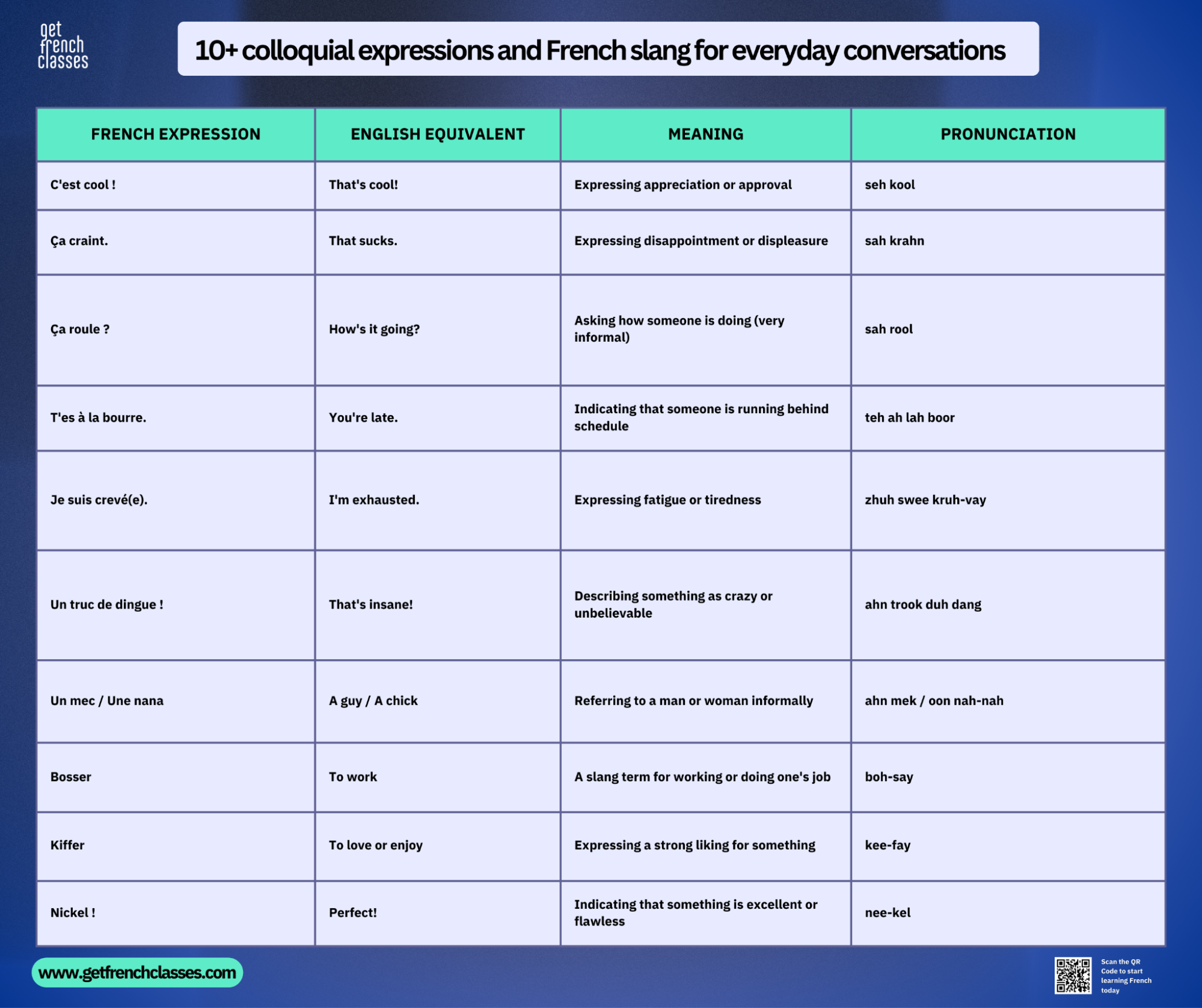
Informal, colloquial expressions, and slang are integral parts of casual French conversations.
These terms add color, personality, and a sense of familiarity to your interactions with French speakers.
Here are some popular colloquial expressions and slang terms to help you navigate informal discussions:
| French Expression | English Equivalent | Meaning | Pronunciation |
|---|---|---|---|
| C'est cool ! | That's cool! | Expressing appreciation or approval | seh kool |
| Ça craint. | That sucks. | Expressing disappointment or displeasure | sah krahn |
| Ça roule ? | How's it going? | Asking how someone is doing (very informal) | sah rool |
| T'es à la bourre. | You're late. | Indicating that someone is running behind schedule | teh ah lah boor |
| Je suis crevé(e). | I'm exhausted. | Expressing fatigue or tiredness | zhuh swee kruh-vay |
| Un truc de dingue ! | That's insane! | Describing something as crazy or unbelievable | ahn trook duh dang |
| Un mec / Une nana | A guy / A chick | Referring to a man or woman informally | ahn mek / oon nah-nah |
| Bosser | To work | A slang term for working or doing one's job | boh-say |
| Kiffer | To love or enjoy | Expressing a strong liking for something | kee-fay |
| Nickel ! | Perfect! | Indicating that something is excellent or flawless | nee-kel |
These colloquial expressions and slang terms are commonly used among friends, family, and in casual settings. They add a relaxed and friendly tone to your conversations and can help you build rapport with French speakers.
" C'est cool ! " is a versatile expression used to show appreciation or approval for something, similar to saying "That's cool!" or "Awesome!" in English.
" Ça craint. " is the opposite, used to express disappointment, dislike, or displeasure. It's a more casual way of saying, "That sucks." or "That's terrible."
" Ça roule ? " is a very informal way of asking "How's it going?" or "What's up?" among friends. It's similar to the English slang phrase "How's it hanging?"
" T'es à la bourre. " is a casual way of telling someone they're late or running behind schedule. It's equivalent to saying, "You're behind!" or "You're running late!"
" Je suis crevé(e). " is a common way to express exhaustion or tiredness, similar to saying, "I'm beat." or "I'm wiped out." in English.
" Un truc de dingue !” “C'est une dinguerie” is an exclamation used to describe something as crazy, insane, or unbelievable. It's like saying, "That's wild!" or "That's crazy!"
" Un mec " and " Une nana " are informal terms for referring to a man and a woman, respectively. They're similar to saying "A guy" and "A chick" in English.
" Bosser " is a slang term for working or doing one's job. It's a casual alternative to the more formal " travailler ."
" Kiffer " is a slang verb meaning to love or enjoy something strongly. It's similar to saying "To be into something" or "To dig something" in English.
" Nickel ! " is an expression used to indicate that something is perfect, flawless, or exactly what you needed. It's like saying "Spot on!" or "Perfect!" in English.
Here's an example scenario.
Talking about a new movie with a friend.
-
T'as vu le nouveau film de science-fiction ? C'est un truc de dingue ! (Have you seen the new sci-fi movie? It's insane!)
-
Ouais, je kiffe les effets spéciaux. C'est nickel ! (Yeah, I love the special effects. It's perfect!)
Here's another example scenario.
Complaining about work to a coworker.
-
Je suis crevé. J'ai bossé tout le weekend. (I'm exhausted. I worked all weekend.)
-
Ça craint. T'es à la bourre pour le projet ? (That sucks. Are you behind on the project?)
And here's a last example scenario.
Casually greeting a friend.
-
Salut, ça roule ? (Hey, how's it going?)
-
Ouais, ça va. Et toi, quoi de neuf ? (Yeah, I'm good. What's new with you?)
Remember that colloquial expressions and slang are best used in informal settings with people you know well. Avoid using them in professional or formal situations, as they may be considered inappropriate or disrespectful.
Asking for Help and Clarification
When traveling to a French-speaking country or communicating with French speakers, it’s essential to know how to ask for help and clarification. Here are some common phrases to help you navigate these situations:
-
Je ne comprends pas (I don’t understand): Use this phrase when you need clarification. For example, if someone speaks too quickly, you can say, “Je ne comprends pas, pouvez-vous répéter?” (I don’t understand, can you repeat?).
-
Pouvez-vous m’aider? (Can you help me?): This phrase is useful when you need assistance, such as directions or information. For instance, “Pouvez-vous m’aider à trouver la gare?” (Can you help me find the train station?).
-
Comment ça va? (How are you?): While this phrase is commonly used to ask about someone’s well-being, it can also be used to seek clarification in a conversation. For example, if you’re unsure about something, you might say, “Comment ça va avec ce projet?” (How is it going with this project?).
-
Où sont les toilettes? (Where are the toilets?): This is an essential phrase when you need to find the restroom. Simply ask, “Excusez-moi, où sont les toilettes?” (Excuse me, where are the toilets?).
Here’s an example scenario:
You’re at a museum and need help understanding an exhibit.
-
Excusez-moi, je ne comprends pas cette exposition. Pouvez-vous m’aider? (Excuse me, I don’t understand this exhibit. Can you help me?)
-
Bien sûr! Cette exposition parle de l’histoire de Paris. (Of course! This exhibit is about the history of Paris.)
Shopping and Numbers
When shopping in a French-speaking country, it’s essential to know some basic numbers and phrases to help you communicate with shopkeepers. Here are some common phrases to help you:
-
Je voudrais… (I would like…): Use this phrase when you want to buy something. For example, “Je voudrais une baguette, s’il vous plaît” (I would like a baguette, please).
-
Combien ça coûte? (How much does it cost?): This phrase is useful when you want to know the price of something. For instance, “Combien ça coûte cette robe?” (How much does this dress cost?).
-
Je suis désolé(e), je ne parle pas français (I’m sorry, I don’t speak French ): Use this phrase to apologize for not speaking French and to ask for help. For example, “Je suis désolé(e), je ne parle pas français. Pouvez-vous m’aider?” (I’m sorry, I don’t speak French. Can you help me?).
-
Un, deux, trois, quatre, cinq (One, two, three, four, five): These numbers are useful when you need to count or specify quantities. For example, “Je voudrais trois croissants” (I would like three croissants).
Here’s an example scenario:
You’re at a market and want to buy some fruit.
-
Je voudrais des pommes, s’il vous plaît. (I would like some apples, please.)
-
Combien ça coûte? (How much does it cost?)
-
Ça fait trois euros. (That’s three euros.)
-
Je suis désolé(e), je ne parle pas français. Pouvez-vous m’aider? (I’m sorry, I don’t speak French. Can you help me?)
By learning these basic phrases and numbers, you’ll be better equipped to navigate shopping experiences in a French-speaking country. Remember, politeness goes a long way, so always say “s’il vous plaît” (please) and “merci” (thank you).
Got months ahead before your trip to France and want to be more prepared and be able to speak French at the A1 level? Check our French language programs at Get French Classes
If you want more than what we just shared with you and actually want to work on your speaking skills, our French courses at Get French classes are made for you.
More specifically, if you choose to learn French at Get French Classes, you will:
-
Learn through bite-sized, interactive lessons that focus on real-life scenarios and expressions used by native French speakers. Say goodbye to generic phrases and hello to contextual learning!
-
Have the opportunity to practice speaking and get personalized feedback with your very own private French tutor . Our tutors are there to guide you, correct mistakes, and help you master nuances.
-
Connect with a global community of French learners through engaging group classes and friendly debates. Not only will you improve your conversational skills, but you'll also make new friends who share your passion for the language.
-
Stay motivated with fun challenges, achievements, and badges to mark your progress. Learning French doesn't have to be a chore – we make it an exciting journey!
-
Have the chance to dive deeper into specialized French vocabulary tailored to your personal or professional goals. Whether you want to discuss art, cuisine, or business, we've got you covered.
🇫🇷 Learn From Meghan's Mistakes!
Meghan spent months trying out techniques like vocabulary memorization, spaced repetition, and gamification apps like Duolingo. None of it worked, instead it ended up being total waste of time and money. She had a breakthrough only after discovering Get French Classes where she went through our active immersion, that helped her:
-
build the daily habits of speaking French,
-
practice under real-life scenarios through private French classes,
-
improve fluency through group classes with other French learners.
Join one of our French courses and start speaking French today.
